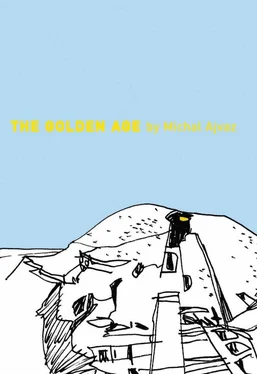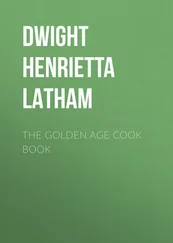Michal Ajvaz - The Golden Age
Здесь есть возможность читать онлайн «Michal Ajvaz - The Golden Age» весь текст электронной книги совершенно бесплатно (целиком полную версию без сокращений). В некоторых случаях можно слушать аудио, скачать через торрент в формате fb2 и присутствует краткое содержание. Год выпуска: 2010, Издательство: Dalkey Archive Press, Жанр: Современная проза, на английском языке. Описание произведения, (предисловие) а так же отзывы посетителей доступны на портале библиотеки ЛибКат.
- Название:The Golden Age
- Автор:
- Издательство:Dalkey Archive Press
- Жанр:
- Год:2010
- ISBN:нет данных
- Рейтинг книги:4 / 5. Голосов: 1
-
Избранное:Добавить в избранное
- Отзывы:
-
Ваша оценка:
- 80
- 1
- 2
- 3
- 4
- 5
The Golden Age: краткое содержание, описание и аннотация
Предлагаем к чтению аннотацию, описание, краткое содержание или предисловие (зависит от того, что написал сам автор книги «The Golden Age»). Если вы не нашли необходимую информацию о книге — напишите в комментариях, мы постараемся отыскать её.
is Michal Ajvaz’s greatest and most ambitious work.
The Golden Age
The Golden Age — читать онлайн бесплатно полную книгу (весь текст) целиком
Ниже представлен текст книги, разбитый по страницам. Система сохранения места последней прочитанной страницы, позволяет с удобством читать онлайн бесплатно книгу «The Golden Age», без необходимости каждый раз заново искать на чём Вы остановились. Поставьте закладку, и сможете в любой момент перейти на страницу, на которой закончили чтение.
Интервал:
Закладка:
So the islanders left crushed berries and fruit juices, the shredded leaves of herbs and trees, pulverized roots — either separately or in mixes with varying proportions — to mature, disintegrate, melt and crystallize, to soften and harden, to dry out, go stale, curdle, ferment and swell. The preparation of a meal would take several days; a lunch or a dinner was often matured for several weeks, even months. But usually the result was worth the wait: the juices, jellies, pastes, purées and powders which these mysterious processes produce are celebrated by European and American gourmets, and I have heard they are used in the most expensive items on the menus of luxury restaurants in Paris, London and New York.
Naturally it was difficult to pinpoint in these processes of transformation where maturation gave way to decay. This is why initially I was mistrustful of the islanders’ cuisine; indeed, I had the impression that all the island’s meals were half-rotten. I took me a long time to get accustomed to them, to learn to appreciate them. It is quite true that when confronted with evidence of what happens to foodstuffs in the pantry-kitchens of the island, people where we come from would, in many cases, observe, “That food’s spoiling.” But by what gauge should we distinguish fairly between the process of the purging of a foodstuff — or, as the islanders call it, the waking of its hidden dreams or the sounding of its inner melodies — and the process of its spoiling and decomposition? Why should we not assume that foodstuffs dream only of sweetness and purity, not of the darker realms of ruin and decay? Even Aristotle, who called dreams matter in forms, conceded the difficulty of determining whether the emergence of vinegar from wine is the genesis of a form or the demise of one.
Once I was accustomed to the island’s cuisine I stopped thinking about what was matured and what was spoiled, stopped searching anxiously for signs of degeneration and decay in its flavours, stopped wondering whether the sweet aftertaste on my palate had in it a tone of growth or a sound of the juices of death. I came to take pleasure in the labyrinth of flavours, which was perhaps still more puzzling and insidious than the maze of the island’s grammar or that of the island’s script. I learned to wander around this new labyrinth, where individual flavour-tones appeared, each with its own world, each world acknowledging, supporting and denying the others. These tones formed a complex figure in which one was mirrored by another; the reflection showed a great, lavish world of foodstuffs, with inner landscapes populated by men and beasts with flowing bodies, where things occurred which were nothing more than the fizzing of energy yet — or so it seemed to me — were no less interesting than stories of Italian lovers from feuding families or irresolute princes in gloomy Danish castles. To lose one’s way in this labyrinth was a joy; it was impossible to extract from it — as things that were foreign — tones of decay, as even rotten tones were part of the maturation of a foodstuff, which as it matured also rotted into pure tones which appeared in its dreams.
On my return to Europe I was once invited to a restaurant where food from the island was served as something very rare and special. I was incensed by the way the European gourmets chose to enjoy it but I did not attempt to explain to my table companions that they did not understand the island’s cuisine and that their interpretation of it was wrong. The flavours of the island were translated carelessly into the language of European cuisine and the result was something extremely banal. The half-rotten tones were taken to be of the same order as high game; the presence of these tones was interpreted as a sophistication that afforded a frivolous delight from being on the edge of the normal, a delight engendered by the risk implicit to being on the border between the eatable and the uneatable. I could not blame my fellow diners for this as they had only a slight knowledge of culinary hermeneutics which was born out of the world of boiled, baked and fried foods and which was of no use to them beyond this world. An islander would have eaten something different in that restaurant, even if he had served himself from the same dishes. For the islander no flavour-tone was on the edge: flavour-tones appeared in a labyrinth which had no centre and no edges.
The last island
Although, as I said, I learned to like the flavours of the island, still there were times when I could not get a morsel of the meals I was offered past my lips, when my gorge would rise at the smells wafting in from the kitchen, when I would dream of goulash and schnitzel with potato salad. Strange to say, Karael experienced such periods of disgust, too. I do not know whether all inhabitants of the island were affected like this and kept this information to themselves or whether it was Karael’s proximity to me which created disorder in how she perceived things. I have to say that it usually seemed she was as resistant to foreign influences as the islanders in general, who had succeeded in chewing up and swallowing Christianity just as they had technological civilization. That the only one on the island forgetting the assumptions of his own world was me; that only I was developing an ever-stronger liking for half-rotten food, for listening to the murmurs and observing the nonsensical, undulating shapes.
As the case may be, at dinner at her house in the upper town Karael would sometimes push away her plate of violet purée and crimson jelly and begin to complain quietly about the island, about its world, about how this was modelled by the island’s grammar, about how the island’s perspective made itself manifest, how the hands of the island touched and the tongues of the island tasted. I had to lean towards her over the bowls and plates in order to catch her quiet lament. She whispered, “Everything always congeals and runs, runs and congeals, it’s so tedious, it’s so grim.” And then, “How I hate all these disgusting purées! If there’s no difference between rotting and maturing, everything is rotten, every flavour is the flavour of death…”
Then she would plead with me. “Take me with you to Europe. Promise me we’ll leave on the next boat. I could work as a shop assistant, as a cleaner. I don’t want to live on this horrible island any longer. The time that passes here is decaying time, rotten time. Past and future ooze out of the runny present…” At her back the world trembled, dissolved in the ever-changing carpet of the wall of water. I took her in my arms and soothed her; I told her that tomorrow a boat would be leaving the harbour, in the morning we would pack our things and go down to the lower town, we would be in Europe in a few days and the island would be just a memory. But the next day we never spoke of what we had said to each other in the evening and we avoided looking towards the harbour and the white boat.
When I complained about the character of the islanders and she defended it, Karael and I would often quarrel. But at these times I never reminded her of the moments when the charges she set against the islanders were graver still than mine, when she thought the island on which she was forced to live was a hell. The moments when she saw the islanders as freaks were nothing but the dark underside of the moments of serene happiness which gave our life on the island its texture. I never saw the islanders as freaks. I had no particular love for them, but I believed them to have the same right to their way of life as we had to ours, that theirs was neither better nor worse than the kind of life we led in Europe. As I had lived it since my childhood the European way of life was closer to me, but it was not that much closer. And after I had been on the island a year, and the sources of new emotions had got into my blood and my eyes had begun to perceive the weavings of rays of light in a different way, I was aware that I was beginning to distance myself from the language of European life and culture.
Читать дальшеИнтервал:
Закладка:
Похожие книги на «The Golden Age»
Представляем Вашему вниманию похожие книги на «The Golden Age» списком для выбора. Мы отобрали схожую по названию и смыслу литературу в надежде предоставить читателям больше вариантов отыскать новые, интересные, ещё непрочитанные произведения.
Обсуждение, отзывы о книге «The Golden Age» и просто собственные мнения читателей. Оставьте ваши комментарии, напишите, что Вы думаете о произведении, его смысле или главных героях. Укажите что конкретно понравилось, а что нет, и почему Вы так считаете.












